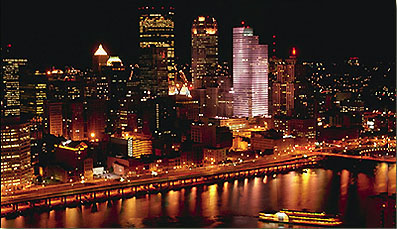|
|
|

Pittsburgh, the second-largest city in Pennsylvania, is located in the southwestern part of Pennsylvania, at the junction where the Allegheny and Monongahela rivers join to form the Ohio river.
Some of the first inhabitants of the area were the Shawnee, Senaca, Deleware, and Iroquois Indians who had left the area by 1754. That year a detachment of troops from Virgina put a fort on the site considering it a strategic spot and called it Ft. Prince George. The French seized the spot and renamed it Fort Duquesne. In 1758, the British took it away from the French, built a new fort and named it after a British Prime Minister, William Pitt. A town developed around the fort and was incorporated as the City of Pittsburgh in 1816.
By the late 1800s, Pittsburgh had become a world leader in iron and steelmaking, and it remained so for nearly a century. In the early 1980s, the country's domestic steel industy collapsed, causing major upheavals in Pittsburgh's manufacturing sector.
The Pittsburgh region underwent a successful diversified economic transition, shifting from heavy industries to light manufacturing, advanced technologies, software engineering, and biomedical technology, medicine, education, finance, and corporate services . Pittsburgh is a national leader in healthcare services and is the world's leading center for organ transplantation. The city is a hub of international business and was ranked eighth by Fortune 500 as a major corporate headquarters center.
Pittsburgh is also a major U.S transportation center is one of the nation's largest inland ports in terms of tonnage.
